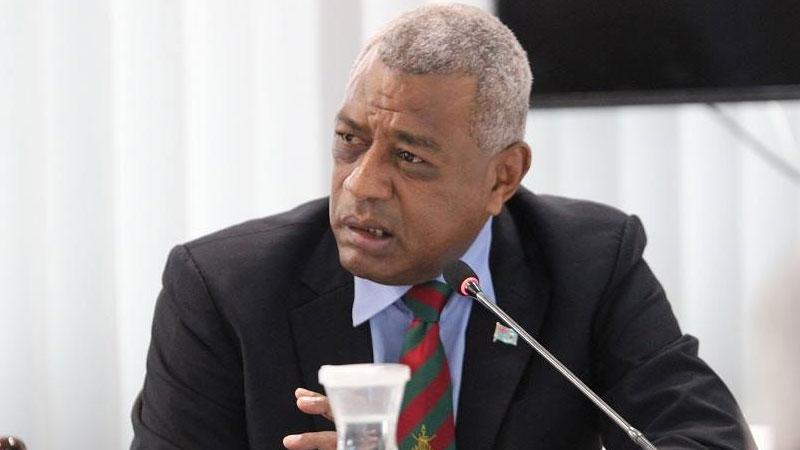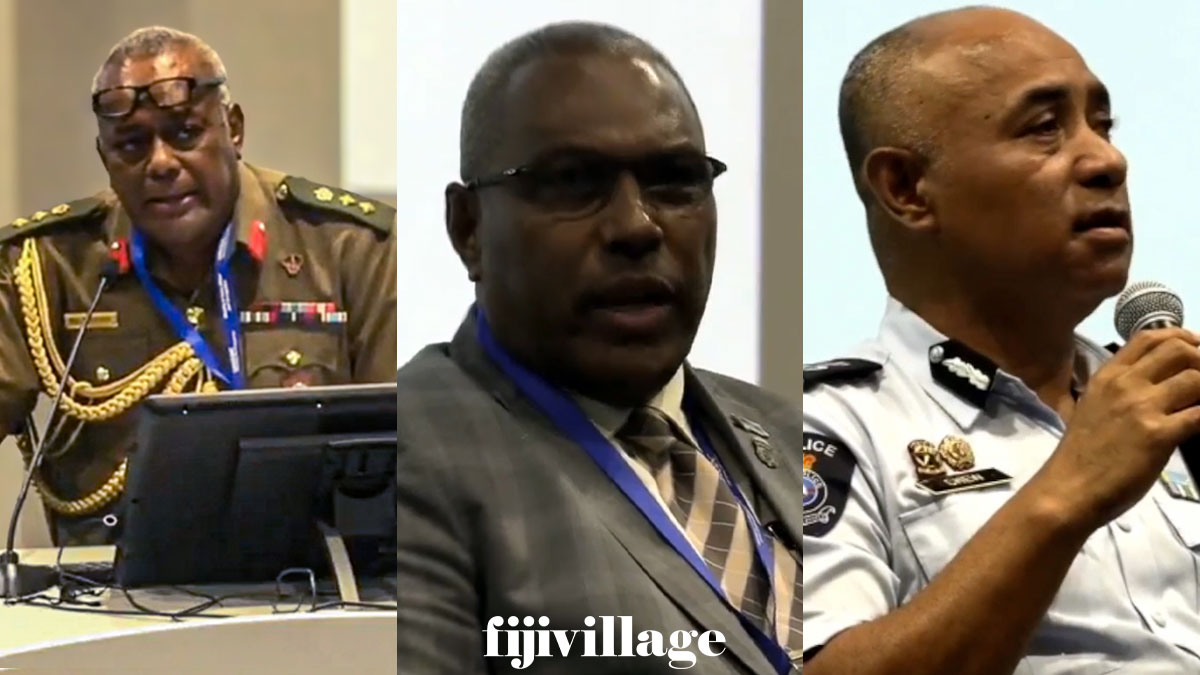
Minister for Home Affairs, Pio Tikoduadua says the recent conviction of the suspended Commissioner of Police would have, in practice, created a vacancy in the office of the Commissioner.
Tikoduadua says as Minister for Home Affairs, he acknowledges the recent statements made by Republic of Fiji Military Forces Director of legal Services, Colonel Kitione Tuinaosara regarding the pressing issue of illicit drugs and the appointment of a permanent Commissioner of Police.
He says they are awaiting the decision of the Constitutional Offices Commission on the matter.
Tikoduadua says the urgency to appoint a new COMPOL is recognized, and the government is actively working towards a resolution.
Colonel Tuinaosara had read out a message from Army Commander Major General Jone Kalouniwai during the Ministry of Home Affairs Talanoa Session on Responding To The Illicit Drugs Situation in Fiji, when he asked him why there is inaction in relation to the drugs issue.
He read the Commander’s message which said that “people don’t know where to start. There is no strategic and operational intent from the government. That is the first sign of inaction. It's all words, everyone knows the Police needs help, they have their internal strife. Why is still there no Commissioner of Police, is government looking for someone to fit their agenda. We need to set the right priorities. Our first obligation should be the safety and well-being of the people.”
While responding to the issue of the Commissioner of Police, Tikoduadua says this appointment process is governed by constitutional framework.
He says according to Section 129(4) of the Constitution, the Commissioner of Police is appointed by the President, on the advice of the Constitutional Offices Commission, following consultation with the Minister responsible for the Fiji Police Force.
He says measures have been put in place to maintain the operational stability and professionalism and morale of our police officers during this period.
Tikoduadua says measures have been put in place to ensure that the Fiji Police Force continues to function effectively under the current leadership structure.
He says they appreciate the input and collaboration from all stakeholders, including the RFMF, in developing effective strategies to address the drug issue.
Tikoduadua says they ask for patience and understanding as they navigate through the appointment process and work towards enhancing of the security measures.

The pervasive threat of illicit drugs has emerged as a pressing concern, rapidly infiltrating and destabilizing our society therefore the Republic of Fiji Military Forces has proposed the utilization of firearms as a deterrent and means of enhancing security measures in tackling the drug crisis.
They are also raising the issue why there is still no Commissioner of Police, and say the priorities have to be set by the government.
While speaking on behalf of Army Commander, Major General Ro Jone Kalouniwai during the Ministry of Home Affairs Talanoa Session on Illicit Drugs and Substance Use Disorders in Fiji, RFMF Director Legal Services Colonel Kitione Tuinaosara says there is a growing call for decisive action to address this complex drug issue which is reaching alarming proportions and posing significant risks to public health, safety, and national security.
Colonel Tuinaosara says the Commander has already stated that drugs is now a national security concern.
However, he says the prospect of RFMF's engagement raises critical questions regarding the risks involved particularly in the absence of robust legislative support and clear guidelines governing military intervention in civilian matters.
He says as we navigate this juncture where the drug problem has evolved into a significant national security concern, it becomes imperative to explore how the RFMF can be effectively mobilized and utilized to confront the challenges posed by illicit drugs while ensuring accountability, legality, and the protection of fundamental rights.
He says through a comprehensive examination of the issues at hand and a commitment to constructive dialogue and informed decision-making, they endeavour to forge a path that not only addresses the immediate threats posed by the drug epidemic but also lays the foundation for sustainable, rights-respecting, and effective strategies for safeguarding our communities and enhancing national security in the face of evolving threats.
He says they have also made suggestions for including the legal and ethical considerations, operational challenges and strategies, legislative support and frameworks, collaborative approaches and community engagement.
He says by implementing these recommendations, Fiji can leverage the RFMF's works effectively and responsibility in addressing the drug issues as a national security concern.
He says a balanced and integrated approach that prioritizes collaboration, community engagement, legal compliance and ethical conduct can pave the way for sustainable progress in combating the drug problem and creating safer healthcare and a resilient society for all its citizens.
Colonel Tuinaosara further says when he questioned the Army Commander on why there is inaction, he was told that people don't know where to start as there is no strategic and operational intent from the government which is the first sign of inaction.
The RFMF has clearly stated that firearms should be used if the situation demands, and Police to coordinate with RFMF.
When questioned, Attorney General Siromi Turaga says he can recall that Police and the RFMF have used weapons before and there was a confrontation with drug dealers in Navosa.
He says if police officers are at risk, then it is fair to afford them that same level of protection.
Turaga says they are comforted by the fact that the strategy is being vetted and he is waiting for it to be tabled to Cabinet for endorsement.
He adds sometimes it takes longer for government agencies to get things right but they are talking.
The Attorney General says the Government is committed to dealing with the drug issues in the country.
When Colonel Tuinaosara was asked if he is satisfied with the government’s stand, he says it is very encouraging.
He says in fact, they have been assisting Police for a very long time and he remembers the incident in Navosa and that was done in self-defence.
He adds they intend to continue with that and if the government allows them to operate with Police especially when firearms are involved.
He further adds that he is not trying to scare anyone here but it will be helpful when dealing with drugs and weapons.
Colonel Tuinaosara stressed that the guns will not be used to conduct a coup or mutiny.
Acting Commissioner of Police Juki Fong Chew says drugs is our common enemy, and police have their role to play especially in combating drugs.
He says they look at the legislation, the support elements and the capabilities they have in order to fight the war against drugs.
Chew says if they hear from their intelligence before a raid is conducted that arms is involved from the other party, they engage the RFMF to assist them, especially when there is a suspicion that arms are involved.
He says this is done in order to safeguard those officers going to do the raid.
The Ministry of Home Affairs in collaboration with the United Nations Office on Drugs and Crime (UNODC) is organizing the two days’ National Talanoa Session on Responding to Illicit Drugs in Fiji Symposium.
The Talanoa session is supported by Communications Fiji Limited, the parent company of fijivillage, FM96, LegendFM, VitiFM, Navtarang, Radio Sargam, and the Fiji National University.
You can watch the full panel discussion on our website, fijivillage.
Click here for stories on the Drugs Situation in Fiji
Stay tuned for the latest news on our radio stations

